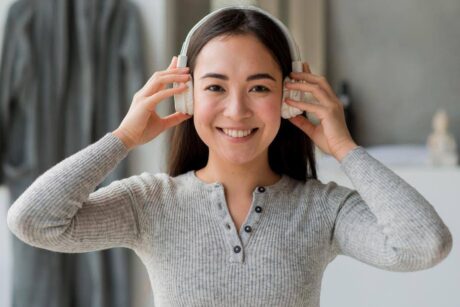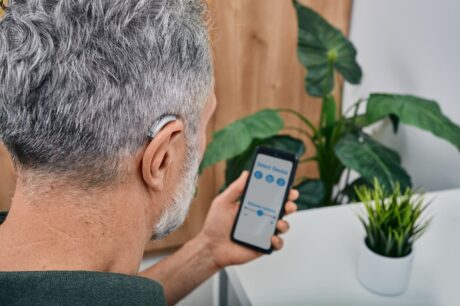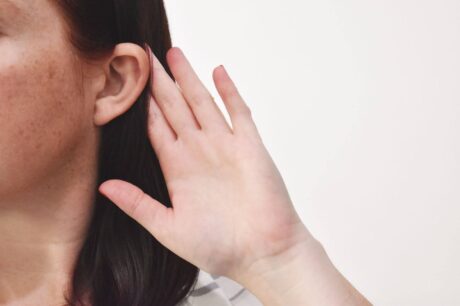Ear popping is a common sensation we’ve all experienced, especially when changing altitudes or dealing with a cold. For some, it can also present as more of a crackling sound in the ear. While it’s usually a harmless and temporary occurrence, persistent ear popping can sometimes be a sign of an underlying hearing issue. Understanding the causes of ear popping and recognising when it may indicate a problem is crucial for maintaining healthy hearing.
Common Causes of Ear Popping
Several factors can contribute to the popping sounds in the ear, some of which are more common than others:
Eustachian Tube Dysfunction
The Eustachian tube is a small passage connecting the middle ear to the back of the throat. Its function is to regulate air pressure in the ear. When this tube becomes blocked or dysfunctional, pressure can build up, leading to popping sounds in the ear. Eustachian tube blockages can be caused by allergies, colds, sinus infections, or even changes in altitude.
Earwax Buildup in the Ear
Earwax, or cerumen, is naturally produced in the ear canal to protect the ear from dirt and debris. However, excessive earwax buildup can create a plug that traps air pressure and causes ear popping. In this case, the popping sound usually accompanies a feeling of fullness or muffled hearing.
Pressure Changes
Activities like flying, scuba diving, or driving through mountains can cause rapid changes in air pressure. These sudden changes can make it difficult for the Eustachian tube to adjust quickly enough, leading to pressure imbalances and the characteristic popping sound in the ear.
Fluid in the Ear
Fluid can build up in the middle ear due to colds, allergies, sinus infections, or upper respiratory infections. This fluid can block the Eustachian tube and interfere with pressure regulation, resulting in ear popping and a feeling of fullness. For most people fluid buildup due to infections are the most common cause of temporary ear popping.
When Ear Popping Indicates a Hearing Problem
While ear popping is often a normal response to pressure changes, there are instances where it could signify a hearing problem and may require a thorough ear check up from a professional in Singapore.
Persistent Ear Popping
If ear popping occurs frequently or doesn’t resolve on its own within a few days, it may indicate an underlying issue with the ear or hearing system.
Associated Symptoms
If ear popping is accompanied by other symptoms like hearing loss, tinnitus (ringing in the ears), dizziness, or ear pain, it’s important to consult an audiologist for an ear check up in Singapore. These symptoms could point to a more serious condition requiring professional attention.
Impact on Daily Life
Persistent ear popping or crackling sounds in your ear can significantly affect your quality of life. It can interfere with communication, concentration, and overall well-being. If you find that ear popping is disrupting your daily activities, seeking help from a hearing professional is recommended.

Why See an Audiologist
Audiologists are hearing healthcare professionals specialising in diagnosing and treating ear and hearing disorders. At Listening Lab, our experienced audiologists can:
- Conduct Comprehensive Hearing Assessments: We offer thorough hearing evaluations, including CAPD (Central Auditory Processing Disorder) tests, to determine the cause of your ear popping and identify any associated hearing problems.
- Utilise Advanced Diagnostic Tools: Our clinic is equipped with state-of-the-art diagnostic equipment to accurately assess your ear health and hearing function.
- Develop Personalised Care Plans: We create individualised treatment plans tailored to your specific needs, focusing on improving your ear health and enhancing your hearing quality. This may involve recommendations for hearing aids, assistive listening devices, or auditory training.
How to Unpop Your Ears Safely
There are several safe and effective techniques you can try to relieve ear pressure and alleviate popping.
- Yawning and Swallowing: These actions can help open the Eustachian tubes and equalise pressure in the middle ear.
- The Valsalva Maneuver: Gently blowing while pinching your nose and closing your mouth can help force air through the Eustachian tubes and relieve pressure.
- The Toynbee Maneuver: Swallowing while pinching your nose can also help equalise pressure and reduce the ear popping sensation.
- Chewing Gum: Chewing gum stimulates swallowing, which can open the Eustachian tubes.
- Hydration: Staying hydrated helps keep the mucous membranes in the Eustachian tubes moist and functioning optimally.
- Avoiding Sudden Pressure Changes: If possible, try to avoid or manage situations that cause rapid pressure changes, such as flying or diving. This is especially important for individuals with a history of ear problems, sinus infections, or allergies.
Don’t Ignore Persistent Ear Popping – Seek Expert Help at Listening Lab
Understanding the causes of ear popping and recognizing when it may signal a hearing problem is essential for protecting your hearing health. If you’re experiencing persistent ear popping or any associated symptoms, don’t hesitate to seek help from the audiology experts at Listening Lab.
We’re committed to providing you with personalised care and comprehensive solutions to improve your ear health and hearing quality. Schedule a consultation with us today for an ear check up in Singapore and take the first step towards better hearing.


















